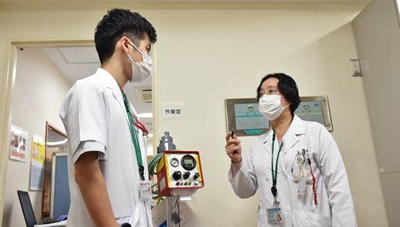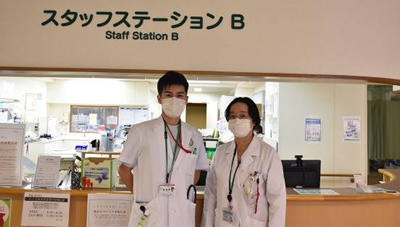School of Medicine at Narita
Faculty of Medicine
Clinical Clerkship Reports 2021

Supervisor report: IUHW Ichikawa Hospital, Neurology, Prof. Emiko Ogino
What do you expect student to do and to understand during the clinical clerkship?
By working with real patients, I want them to learn things such as taking medical history and physical examination which they cannot learn in a classroom and build a good rapport with them. Real patients are often elderly and, unlike the simulated cases, often have multiple problems at the same time. Not only do they have medical problems, but they also have a variety of social problems as a result of their "illness". It is not enough to have mere knowledge, but to have the insight to see where the problem lies, to integrate the various information, to priorities and to implement specific treatment and care.
Was there any particular occasion when you felt the achievement of students’ three years of study?
When they were able to listen attentively to patients and consider from a holistic medical point of view, including their suffering and the impact of the disease on their lives, rather than simply looking at them with medical knowledge, I felt that the education I had gave through the repeated courses in medical professionalism had had a positive impact. I am also delighted when I receive compliments from patients about these students, as if they were my own children. I have also felt the results of my education when I was able to carry out basic medical interviews and physical examinations.
What did you feel our medical students were unique compared to medical students from other universities?
Our university has been conducting active learning from the early grades, and many of our students have good communication skills, probably because we have frequent discussions. In addition, our university has many social welfare classes, which is unusual for a medical school. When I see them proposing post-discharge plans that are rooted in their daily lives, I feel that the concept of ICF that they have learned in their multi-professional cooperation education is being utilized.
Were there any occasions in which you felt that students were able to make use of what they had learned about medicine in English?
During the clinical training, various medical terms in English are used when explaining to students, and I felt that they were able to understand them without feeling uncomfortable. There are also situations where students use English articles as references to discuss the cases they are assigned to, and some of them acquire medical knowledge using English as a matter of course.
What would you like to say to exam candidates?
The opportunity to participate in clinical training in various regions (Narita, Mita, Ichikawa, Atami, Tochigi, Kyushu and overseas) and types of medical care (urban, community-based, acute, convalescent and chronic), after learning practical skills such as medical interviewing, physical examination and medical professionalism from an early stage, is a valuable experience and contributes to the retention of knowledge more than mere classroom learning.

Student report: Tomoki Yashio
Student report: Tomoki Yashio
We arrive at the hospital about half an hour before the 8.40am meeting time and check the patients' medical records. On days when there was an operation, we observe the operation in the morning. In the afternoon, there would be a lecture and a briefing about the operation. We go home at around 8pm, write a case summary, prepare for the next day, and then go to bed.
Was there any particular occasion when you felt the achievement of your three years of study?
I feel especially when I talk to my patients. The knowledge that I have gained has helped me to understand the causes of symptoms, but I also realise that there are aspects such as the attitude towards patients, that I have acquired through classes such as Medical Professionalism.
Were there any occasions when you felt the achievement of the integrated clinical teaching?
I think that the basics are important in any field, but I feel it again in practice. The teacher said, "You have to understand the symptoms and conditions, not memorize them", and I often feel that this is really true.
Did you find any differences between what you learned at university and what you do in the field?
I often feel that there is a difference between "medicine" and "medical care". I felt that short-sighted thinking like solving a test question does not work in the field. Of course the ability to solve problems on paper is important, but I learned that it is equally important to have a way of thinking that can be applied in practice.
What is the most memorable experience you have had with a patient?
It must have been a burden for patients to be asked the same questions over and over again by trainees, but they said to me “thank you", that made me think I want to do everything I could to help them.
What was your memorable experience with the other medical professions?
In situations where various professions such as nurses, physiotherapists, occupational therapists and speech and language therapists were intervening, there were times when patients showed different facial expressions from they had shown to doctors and trainees. I felt that in departments where these expressions and complaints were shared, patients often made positive comments.
Were there any occasions you felt you "grew up" during your clinical clerkship?
At the beginning of clinical clerkship, I painfully felt a sense of helplessness what I didn't understand and what I had to do. However, as I faced the training, I gradually began to think, "I'll try, even if only a little”.
What do you think about the teachers who supervise your clinical training? Did your impressions change between the campus and the medical field?
When I saw the teachers working as doctors in the medical field, I was able to get a better understanding of what they tried to teach us in class. It's not so much that my impressions have changed, but it's more that I feel I changed to be able to catch more of what the teachers tried to tell us on campus.
Have you decided which department you would like to pursue through clinical training?
I would like to make a decision after I understand the characteristics, attractiveness and satisfaction of each department through clinical training. I feel that it was a good opportunity for me to have time to think about my career path.
About the environment during the clinical training (location of the hospital, living environment, living conditions, etc.)
Hospital is located close to the station, a 5-minute walk from the Hokuso Line's Yagiri Station. It is halfway between Kozunomori, where the university is located, and Tokyo. In my case, I was able to commute from home, which meant less stress and allowed me to concentrate on my studies.



